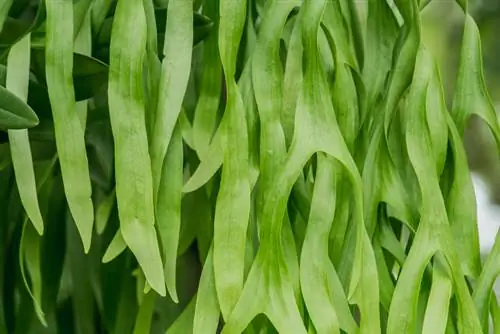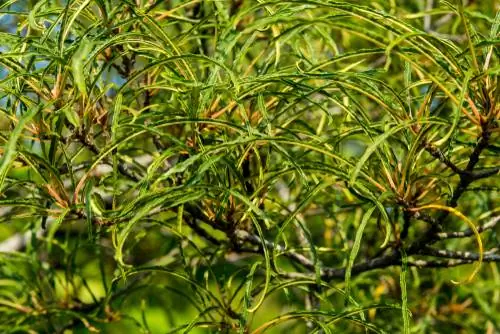- Author admin leonars@hobbygardeners.com.
- Public 2023-12-16 16:46.
- Last modified 2025-01-23 11:22.
The Ficus Ginseng (bot. Ficus microcarpa) is poisonous like all other Ficus species. It is only considered slightly poisonous to adults and is relatively harmless thanks to its bitter taste. But it can also cause skin irritation.

Is Ficus Ginseng poisonous?
Ficus ginseng (Ficus microcarpa) is slightly toxic to humans and can cause skin irritation. In children, even a small amount can cause gastrointestinal problems. The plant is also poisonous to animals such as rodents, cats and birds and can be fatal.
How does poisoning manifest itself?
There is little risk of serious poisoning from the easy-care Ficus Ginseng in an adult, as consumption is almost impossible due to its bitter taste. In children, however, even a relatively small dose is dangerous. Gastrointestinal symptoms such as nausea, vomiting and diarrhea occur quite quickly. If you suspect anything, consult a pediatrician immediately.
Not only consumption but also skin contact with Ficus Ginseng is harmful to he alth. Avoid direct contact with the milky plant sap, it is very irritating to the skin and mucous membranes. It is therefore better to wear gloves when cutting and repotting. If plant sap does get on your skin, rinse it off immediately with plenty of fresh water.
Symptoms of poisoning in brief:
- Vertigo
- Nausea
- Stomach cramps
- Vomiting
- Diarrhea
How does Ficus Ginseng work on animals?
Green plants often have an irresistible appeal to animals. This can easily be fatal for the animals with Ficus Ginseng, because just three to four leaves can represent a fatal dose for small rodents. At least symptoms of paralysis can easily occur with this amount. Cats are at risk of kidney failure. Ficus ginseng is also poisonous to birds.
Tip
It is essential to place a Ficus Ginseng out of the reach of (small) children and pets, this is the best way to avoid the risk of poisoning.






